
1897 Austria: Composer Gustav Mahler is appointed the director of the Vienna Court Opera. [For further information, click here.]
1912 First Balkan War: Montenegro declares war on Turkey:
Ten days later the allies entered the war. Within a few weeks, Turkey had been pushed back to maintaining the defense of Constantinople. Albania, Epirus, Macedonia and Thrace were now possessions of the Balkan States. Serbia had also reached the Adriatic at Durazzo, which gave them an important sea port. Both Austria and Italy were opposed to this acquisition because they feared that a Serbian port on the Adriatic would ultimately become a Russian port. Also, Austria and Italy could not allow this.
1914 List Regiment:
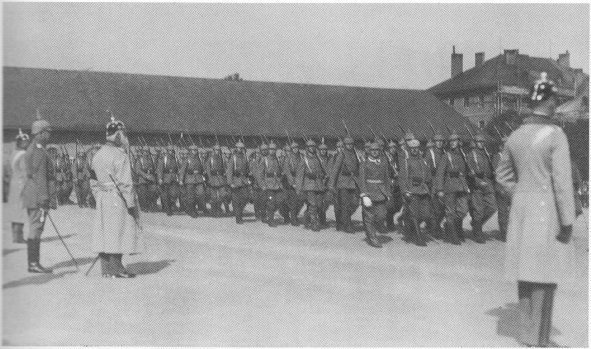
Infantry Recruit Adolf Hitler and his comrades take their Oaths of Allegiance: Germans swore allegiance to Kaiser Wilhelm II. Austrians swore allegiance, not only to the German Kaiser, but also to King Ludwig of Bavaria, and to their own monarch: Kaiser Franz Josef. Standing next to Hitler was Ernst Schmidt, who would probably be his closest wartime companion.
Ernst Schmidt:
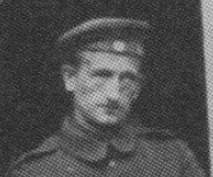
On the day of the swearing-in, there was a double-ration of roast pork and potato salad. Hitler told me several times that the festive day remained particularly pleasant in his memory, as he was always hungry. During the war he was known for being always hungry, and could become ill when the food supply was delayed.
From Adolf Hitler's Mein Kampf:
As the scene unfolds itself before my mind, it seems only like yesterday. I see myself among my young comrades on our first parade drill, and so on until at last the day came on which we were to leave for the front.
In common with the others, I had one worry during those days. This was a fear that we might arrive too late for the fighting at the front. Time and again that thought disturbed me; and every announcement of a victorious engagement left a bitter taste, which increased as the news of further victories arrived. [For further details, Click here.]
1915 World War I: The Battle of Loos: one of the fiercest of the war, ends with virtually no gains for either side. Almost 430,000 French, British and Germans are killed, with the British using poison gas for the first time in the battle.
1915 World War I: List Regiment (Oct 7 - 14):
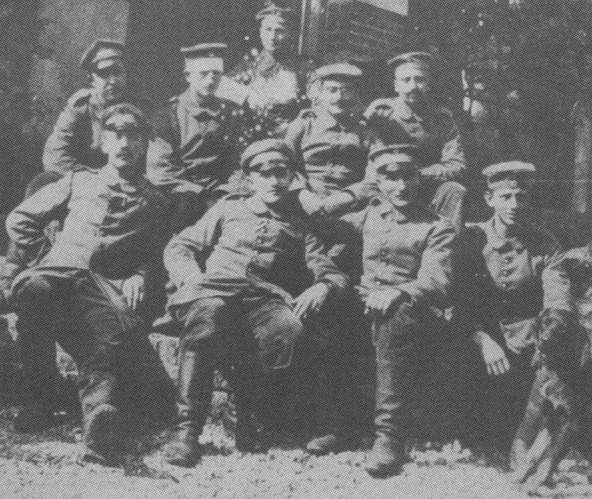
Gefreiter Adolf Hitler's regiment serves with 16 Reserve Infantry Regiment at Fromelles. [For further details, Click here.]
1916 Voelkishness: During a provincial meeting of the Germanenorden at Gotha in Thuringia, members from Berlin urge the Gotha assembly to remove Hermann Pohl as Chancellor. Pohl is incensed and declares himself Chancellor of a schismatic Germanenorden Walvater of the Holy Grail. Pohl succeeds in carrying with him the already established lodges in Silesia (Breslau), Hamburg, Berlin and the Osterland (Gera). Pohl's supporters in Berlin are G.W. Freese and Bräunlich, who found new Berlin lodges in the city and at Gross-Lichterfelde. (THP)
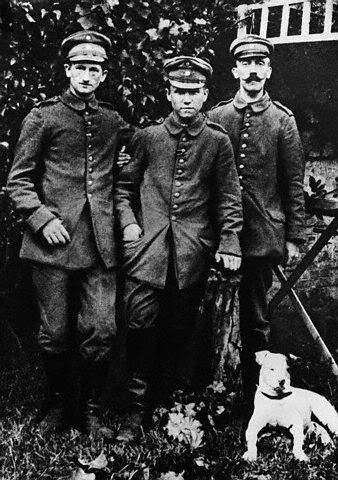
Schmidt, Amann, Hitler, Fuchsl]
Gefreiter Adolf Hitler, after being wounded the previous day while running a dispatch on the Somme Front, is transported by ambulance train to a Red Cross hospital in Beelitz, near Berlin.
From Adolf Hitler's Mein Kampf:
Two years had passed since I had left home, an almost endless period in such circumstances. I could hardly imagine what Germans looked like without uniforms. In the clearing hospital at Hermies I was startled when I suddenly heard the voice of a German woman who was acting as nursing sister and talking with one of the wounded men lying near me. Two years! And then this voice for the first time!
The nearer our ambulance train approached the German frontier the more restless each one of us became. En route we recognized all these places through which we passed two years before as young volunteers – Brussels, Louvain, Liège – and finally we thought we recognized the first German homestead, with its familiar high gables and picturesque window-shutters. Home!
What a change! From the mud of the Somme battlefields to the spotless white beds in this wonderful building. One hesitated at first before entering them. It was only by slow stages that one could grow accustomed to this new world again. But unfortunately there were certain other aspects also in which this new world was different. [For further details, Click here.]
1917 World War I (Sep 30-Oct 17): Hitler takes an eighteen-day furlough to accompany Schmidt on a visit to his sister in Dresden with him. After sightseeing stops at Brussels and Cologne, they hit Leipzig, a city Hitler especially enjoys. He is impressed by the 300-foot tall monument, Battle of the Nations, honoring the war-dead of 1812. "This has nothing to do with art," he tells Schmidt (above), "but it is enormous and beautiful." After spending some time with Schmidt in Dresden, Hitler goes off by himself to Berlin to spend a few days with yet another front-line comrade. In a postcard to Schmidt, he writes: "The city is marvelous. A real world capital. Traffic is still tremendous. Am gone almost all day. Now finally have opportunity to study the museums a little better. In short: there is nothing lacking." [For further details, Click here.]
1918 World War I: Sgt Alvin York of Tennessee becomes a World War I hero: by almost single-handedly killing 25 German soldiers, and 132 in the Argonne Forest in France.
For his actions, York was singled out as the greatest individual soldier of the war and when he returned home in 1919 he was wooed by Hollywood, Broadway, and various advertisers who wanted his endorsement of their products. York turned his back on quick and certain fortune in 1919, and went home to Tennessee to resume peacetime life. Largely unknown to most Americans was the fact that Alvin York returned to America with a single vision. He wanted to provide a practical educational opportunity for the mountain boys and girls of Tennessee. Understanding that to prosper in the modern world an education was necessary, York sought to bring Fentress County into the twentieth century. Thousands of like-minded veterans returned from France with similar sentiments and as a result college enrollments shot up immediately after the war. [For further details, Click here]
1918 World War I (Sep 28-Oct 15):
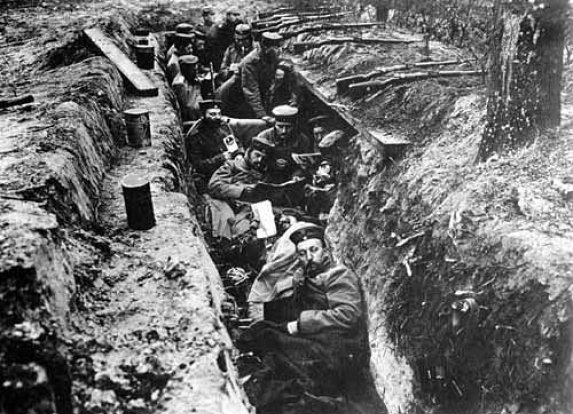
Gefreiter Adolf Hitler participates in defensive operations in Flanders with 3 Company, 16 Bavarian Reserve Infantry Regiment. [For further details, Click here.]
1932 India: The Indian Air Force is founded as an auxiliary air force of the Indian Empire. [For further information, click here.]
1933 Various:
USA: The St. Louis, Missouri, chapter of the Friends of New Germany, a pro-Nazi organization, begins operating.
Germany: Holocaust: All Jewish jockeys are banned from German race tracks.
1934 Zionism: Chaim Weizmann demands that Transjordan be opened for Jewish business and settlement. (THP)
1938 Holocaust: Hitler issues a decree establishing SS-Sicherheitpolizei Sonderkommandos (SS Security Police Special Units) for duty in the Sudetenland.
1939 World War II: Various:
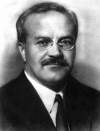
From the Chairman of the Council of People's Commissars of the Soviet Union (Molotov) to the German Ambassador in the Soviet Union (Schulenburg):
Mr. Ambassador: I have the honor hereby to confirm that in connection with the secret supplementary protocol, concluded on September 29 [28], 1939, between the USSR and Germany, concerning Lithuania, the following understanding exists between us: 1) The Lithuanian territory mentioned in the protocol and marked on the map attached to the protocol shall not be occupied in case forces of the Red Army should be stationed [in Lithuania]; 2) It shall be left to Germany to determine the date for the implementing of the agreement concerning the cession to Germany of the above-mentioned Lithuanian territory. Please accept, Mr. Ambassador, the expression of my highest consideration.
German Foreign Office Memorandum:
Outlines For My (Schnurre) Conversations In Moscow.
1) The credit and trade treaty of August 19 of this year is not to be tampered with from either side. However, for our benefit, we must attempt to obtain a more expeditious delivery of raw materials (180 million Reichsmarks).
2) My principal task in the negotiations will be to find out whether Russia, over and above the treaty of August 19, 1939, could and would compensate for the loss in imports by sea and to what extent this might be done. The military and civil agencies have handed me a schedule of requirements totaling 70 million marks of immediate additional supplies. (Enclosure 1) The requests which I shall present in Moscow will go far beyond this schedule, as the German war needs are several times as great as the proposal of the Departments for the negotiations. (See enclosure 2.) But the relatively modest schedule of departmental requirements shows how low the actual capacity of Russia for supplying raw materials is estimated. The reasons are inadequacies of transportation, of organization, of production methods, etc.
3) The plan to be proposed to the Russians would be as follows: Apart from the treaty of August 19, 1939, the Soviet Union shall supply us X millions worth of raw materials, both such as are produced in Russia and such as Russia buys for us from other neutrals. The German quid pro quo for these raw materials could not follow at once, but would have to take the form of a supply and investment program, to extend over a period of about five years. Within this time we would be prepared, in order to meet our obligations arising from Russian deliveries of raw material, to set up plants in Russia in accordance with a large-scale program to be agreed upon. (See enclosure 3.)
4) Within the framework of purely economic negotiations, the difficulties actually existing in Russia cannot be overcome, especially as we demand of the Russians performance in advance. A positive achievement can really only be expected, if an appropriate directive is issued by the highest Russian authorities, in the spirit of the political attitude toward us. In that respect these negotiations will be a test of whether and how far Stalin is prepared to draw practical conclusions from the new political course. The raw materials deliveries requested by us can only be carried out, in view of the unsatisfactory domestic supply situation of Russia, at the expense of their own Russian consumption.
5) Depending on the result of my conversations, it will be necessary that the raw materials program be taken up again from the strictly political point of view by a qualified personage.
6) In the Moscow negotiations it should furthermore be ascertained to what extent our imports heretofore made from Iran, Afghanistan, Manchuria, and Japan, can be transmitted via Russia.
Press Reaction to Hitler's October 6 Speech:
M. Hitler tried to get out of the dilemma into which his policies have driven him by savagely attacking Poland and by buying the alliance of Bolshevik Russia at an exorbitant price. In short, M. Hitler, while affirming his desire to see the end of hostilities, continues to demand that the world bow before the fait accompli of the annihilation of Poland. He continues to show his determination to exclude all the other powers from the East, where Germany, allied with Soviet Russia, wishes to exercise absolute rule. He calls for the end of hostilities and suggests a conference. But he begins by advancing the principle that Germany must obtain not only her old colonies, but colonies commensurable to the interests and the greatness of the Reich. Such impudence leaves one stunned, and we ask ourselves how he can dare to make such grandiose claims in the face of powers which have put him in such a critical position; for the speech reveals clearly that he has only slight confidence in the developments of the war which he has unleashed and which he is now unable to curb, even though he wishes to. (Le Temps)
The evacuation of Germans from Latvia begins following permission by the foreign ministries of Latvia, Estonia and Lithuania to evacuate Baltic Germans:
The Baltic Germans were followed by ethnic Germans from Volhynia, Galicia and Narew in the first months of 1940 and in the summer, Germans from the territories of Bessarabia and Bukovina annexed by the Soviets from Romania and from the Romanian territory of Dobrudja. These were in the end followed by Germans from Lithuania in early 1941 and Nachumsiedler (late resettlers) from Estonia and Latvia. March 1941 some 500,000 Volksdeutsche were returned, half of whom were still in camps, but from these regions 408,000 Poles and Jews were displaced to the General Government. Thus, it is no coincidence that present day research indirectly places the beginning of the systematic destruction of Jews with the ethnic reorganisation of Eastern Europe, namely the transportation of the Baltic Germans. (accessed 05.10.09)
World War II: Large numbers of German troops arrive in Romania to train the Romanian army, and to protect Romanian oil fields from British sabotage. The arrival of German troops effectively places Romania under German control.1940 Various:

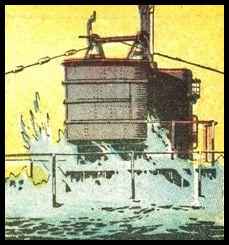
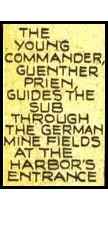
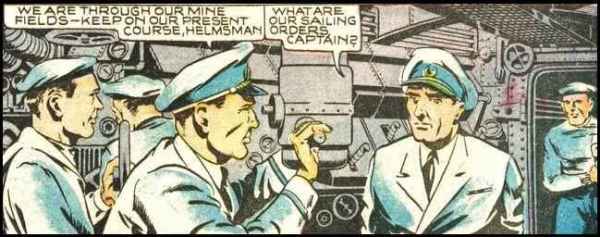
War At Sea: Guenther Prien's U-47 gets underway from the German naval base at Kiel on a daring mission to raid Scapa Flow in the Orkney Islands north of Scotland.
From the Japanese Embassy to the US State Department:
The fact that the majority of essential articles and materials that Japan desires to import from America is placed under licensing system is causing a feeling of tension among the people of Japan, who naturally presume that the system is intended to be a precursor of severance of economic relations between Japan and the United States. In view of the high feeling in Japan it is apprehended that, in the event of continuation by the United States Government of the present attitude toward Japan in matters of trade restriction, especially if it leads to the imposition of further measures of curtailment, future relations between Japan and the United States will be unpredictable.
[See: Countdown to Infamy: Timeline to Pearl Harbor.] 1941 World War II: Germans overrun Mariupol, in southern Russia:On this day in 1941, the German invasion of the Soviet Union begins a new stage, with Hitler's forces capturing Mariupol. The Axis power reached the Sea of Azov.
Despite the fact that Germany and Russia had signed a "pact" in 1939, each guaranteeing the other a specific region of influence without interference from the other, suspicion remained high. Despite warnings from his advisers that Germany could not fight the war on two fronts (as Germany's experience in World War I proved), Hitler became convinced that England was holding out against repeated German air assaults, refusing to surrender, because it had struck a secret deal with Russia. Fearing he would be "strangled" from the East and the West, he created, in December 1940, "Directive No. 21: Case Barbarossa"--the plan to invade and occupy the very nation he had actually asked to join the Axis only a month before.
On June 22, 1941, after having postponed the invasion of Russia when Italy's attack on Greece forced Hitler to bail out his struggling ally in order to keep the Allies from gaining a foothold in the Balkans, three German army groups struck Russia hard by surprise. The Russian army was larger than German intelligence had anticipated, but they were demobilized. Stalin had shrugged off warnings from his own advisers, even Winston Churchill himself, that a German attack was imminent. By the end of the first day of the invasion, the German air force had destroyed more than 1,000 Soviet aircraft. And despite the toughness of the Russian troops, and the number of tanks and other armaments at their disposal, the Red Army was disorganized, enabling the Germans to penetrate up to 300 miles into Russian territory within the next few days.
Hitler's battle for Stalingrad and Moscow still lay ahead, but the capture of Mariupol, at the sea's edge, signaled the beginning of the end of Russia-as least as far as Hitler's propaganda machine was concerned. "Soviet Russia has been vanquished!" Otto Dietrich, Hitler's press chief, announced to foreign journalists the very next day. (History.com)
1942 World War II Various:
From the Voelkischer Beobachter:
In future any terrorist and sabotage units of the British and their accomplices, who do not behave as soldiers but as bandits, will be treated as such by the German troops and shot on the spot without mercy, wherever it may be.
From a memorandum of the Secretariat of State of the Holy See to the German Embassy:
For quite a long time the religious situation in the region called 'Warthegau' gives cause for very grave and ever-increasing anxiety. There, in fact, the Episcopate has been little by little almost completely eliminated; the secular and regular clergy have been reduced to proportions that are absolutely inadequate, because they have been in large part deported and exiled; the education of clerics has been forbidden; the Catholic education of youth is meeting with the greatest opposition; the nuns have been dispersed; insurmountable obstacles have been put in the way of affording people the help of religion; very many churches have been closed; Catholic intellectual and charitable institutions have been destroyed; ecclesiastical property has been seized.
Poland: The AK (Polish Home Army) cuts six main rail lines in Warsaw used by the Germans as their main routes of military transport to the Eastern Front in the USSR.
1943: This day’s Magic summary, a compilation of decoded Japanese and German communications presented to FDR daily, contains a dispatch from Baron Oshima, Japans representative in Berlin, informing his home office of developments. Oshima tells of a new "terror-weapon." long-range rocket guns, due to be deployed in mid-December, and opines that the effect of the weapon as a "means of military retaliation will be equaled only by the political reverberations." (Lee)
[See: Wunderwaffen: Hitler's Deception and the History of Rocketry.]1944 World War II: Various:
Finland: the port of Kemi—the last held by German forces—is recaptured:
In their retreat the German forces under General Lothar Rendulic devastated large areas of northern Finland using scorched earth tactics. More than one-third of the dwellings in that area were destroyed, and the provincial capital of Rovaniemi was burned to the ground. All but two bridges in Lapland were blown up and many roads were mined. In addition to the property losses, estimated as equivalent to about US $300 million (in 1945 dollars, which today is equivalent to $3.15 billion in 2005 dollars), about 100,000 inhabitants became refugees, a situation that added to the problems of postwar reconstruction. (After the war the Allies convicted Rendulic of war crimes, and they sentenced him to 20 years in prison.) The last German troops were expelled in April 1945. By that time only 600 Finnish troops, mostly fresh recruits, were left facing them.
Western Front: US Ninth Army reaches the outskirts of Aachen on the German border:
American commanders decided to besiege the city, and cut it off from supply and other essentials. However, the Germans had a different view. The city was important in German history, being the coronation site of Charlemagne, and the home of the Holy Roman Empire (later called Holy Roman Empire of the German Nation), or what Hitler deemed the 'First Reich.' Moreover, this was the first major German city to face invasion, so Hitler ordered that the city be held at all costs. [For further details, Click here]
Greece: British troops occupy Corinth:
Beginning in 1942, the Allied Big Three (Churchill, Roosevelt and Stalin) met to shape a secure post-war world. Their plans centered on Germany and made few references to the Balkans. As a result, later decisions about the Balkans were made on the basis of immediate operational situations instead of long-term strategic plans, and this ad hoc approach led to misunderstandings. During 1943, the Big Three made plans for a coordinated post-war security system and agreed that an important element was installing "democratic" governments in the defeated states. The Western powers had in mind Western-style parliamentary states protected by the United Nations. Stalin on the other hand interpreted "democratic" to mean "anti-fascist" and believed that Soviet security required Russian approval of any post-war governments in Eastern Europe. This basic disagreement was never resolved.
1945 Nuremberg Tribunal:
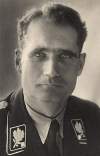
A confused and seemingly amnesiac Rudolf Hess arrives in Nuremberg.
1957: From an NCS (National Security Council) Memorandum:

Apparently, the thrust of the rocket used by the Russians to put up their Satellite was around 200,000. The thrust of our rockets runs from 27,000 (Navy), up to 150,000 at present. It is believed that the Russian rocket was the one used in their August rocket tests. Quarles pointed out that the Army had sent up a rocket within a year 6/700 miles in the air. Its speed was much lower than the speed of the rocket used by the Russians-probably mach 12 at the peak-with a very much lower speed at the top of the trajectory.
According to the newspapers, the Russians have offered to take up some of our instrumentation in the next Satellite launched. This will pose a very difficult problem for us, as we do not think they know how to make some of the very delicate material, which we will include in our Satellite. Apparently, our scientists believe the present Russian Satellite is far more crude, and less instrumented, than what we have in mind. [For the full text, Click here.]
1962 German Federal Republic: Newsmagazine Der Spiegel reveals the unpreparedness of the West German armed forces against the communist threat from the east, and is accused of treason shortly afterwards. [For further information, click here.]
1982 Polish Revolution: All labor organizations in Poland, including Solidarity, are banned.
1990 United Germany signs its first international treaty, agreeing with Czechoslovakia on a program for cleaning up the polluted River Elbe.
1991 The Soviet Union agrees to remove an estimated 45,000 troops from Poland by the end of 1992.
1992 Death: Willy Brandt of intestinal cancer at his home outside Bonn; former West German chancellor.
Edited by Levi Bookin (Copy editor)
levi.bookin@gmail.com



Click to join 3rdReichStudies




Disclaimer: This site includes diverse and controversial materials--such as excerpts from the writings of racists and anti-Semites--so that its readers can learn the nature and extent of hate and anti-Semitic discourse. It is our sincere belief that only the informed citizen can prevail over the ignorance of Racialist "thought." Far from approving these writings, this site condemns racism in all of its forms and manifestations.
Fair Use Notice: This site may contain copyrighted material the use of which has not always been specifically authorized by the copyright owner. We are making such material available in our efforts to advance understanding of historical, political, human rights, economic, democracy, scientific, environmental, and social justice issues, etc. We believe this constitutes a "fair use" of any such copyrighted material as provided for in section 107 of the US Copyright Law. In accordance with Title 17 U.S.C. Section 107, the material on this site is distributed without profit to those who have expressed a prior interest in receiving the included information for research and educational purposes. If you wish to use copyrighted material from this site for purposes of your own that go beyond 'fair use', you must obtain permission from the copyright owner.
Please Note: The list-owner and moderators of 3rdReichStudies are not responsible for, and do not necessarily approve of, the random ads placed on our pages by our web server. They are, unfortunately, the price one pays for a 'free' website.